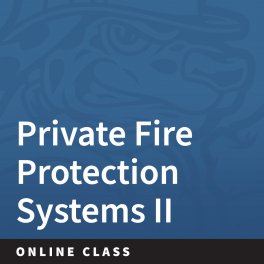2541 Private Fire Protection Systems II
Ricky Rescue Training Academy's FFP/ATPC 2541 Private Fire Protection Systems 2 is a 45-hour self-paced, online course with ongoing enrollment and one of the four mandatory courses for Florida Fire Inspector 2 certification. FFP 2541 also provides 45 CEUs for the Florida State Fire Safety Inspector certificate renewal program.
FFP 2541 gives students in-depth knowledge of portable and pre-engineered fire protection systems, including:
- Extinguishing agents
- Alarm systems
- Code compliance inspection and enforcement procedures
Online Fire Inspector 2 Certification FFP/ATPC 2541 Course Objectives
Upon successful completion of this course, students will be able to:
- Describe and understand the basic design concepts that underpin fire alarms and special hazard systems, including contract drawings and contract drawing packages, contract documents, and required items in a designer's survey kit.
- Impartially discuss the ethical and professional responsibilities involved in carrying out fire safety inspections.
- Be aware of the ethical and professional responsibilities of other personnel involved in the design and implementation of fire alarms and special hazard systems.
- Describe and understand special hazard suppression agents and be familiar with their respective applications in relation to the type and class of fire.
- Discuss the following types of extinguishing agents and systems, including their design, application, advantages, limitations, and required safety precautions:
- Low-Expansion Foam System Design
- Medium- and High-expansion Foam Systems Design
- Water Mist Systems
- Ultra High-Speed Explosion Suppression Systems and Ultra High-Speed Water Spray Systems
- Clean Agent and Halon Replacement Extinguishing System Design
- Carbon Dioxide System Design
- Dry Chemical and Wet Chemical Extinguishing System Design
- Demonstrate expert knowledge of the various types of alarm and fire detection systems currently in use, including their:
- The most appropriate deployment,
- Correct and safe operation,
- Reliability,
- Stated performance objectives
- Discuss currently available fire alarm system initiating devices (manual, heat, smoke, gas, flame), their applications, reliability, capabilities, limitations, and design.
- Discuss fire alarm notification signals and the various types of notification appliances available (audible, visible, tactile), be familiar with notification systems design and regulations, particularly around audibility and visibility requirements, and know what an annunciator panel is and its function.
- Be familiar with the various types of fire detectors (beam, flame, gas, duct), their required placement parameters, and the reasons for those parameters.
- Explain the different types of fire alarm control units and circuit designs, their function, the differences between them, the advantages and limitations of each, their appropriate applications, and be capable of drawing diagrams and plans of fire alarm systems.
Required Course Materials - Online Fire Inspector 2 Certification FFP 2541
In addition to enrolling in this course, students in the online Fire Inspector 2 certification FFP 2541 course must have:
- Recommended Book: used by FSFC – Design of Special Hazard and Fire Alarm Systems; Thomson Delmar Learning (2008) ISBN: 978-1418039509
- NOTE: This book is not included with your purchase of this course but can be purchased through technical bookstores or online
- NOTE: Before purchasing any textbooks, ensure that you are using the correct ISBN as there may be several versions of the title available, depending on customization requirements for individual schools.
- A high-speed internet connection and a device capable of connecting to the Internet and reading MS Word, PowerPoint, and Adobe documents
- CHAMILO_CODE 2541
When completing an online or blended class through Ricky Rescue Training Academy, you will be held completely responsible for your own achievements. You must ensure that you work consistently and diligently to complete the coursework and related requirements in order to move forward. These open enrollment courses allow you to pace yourself, but will require sufficient self-discipline to keep up to date with the workload. Therefore, it is your responsibility to set aside the time required to complete the various units of these courses.



